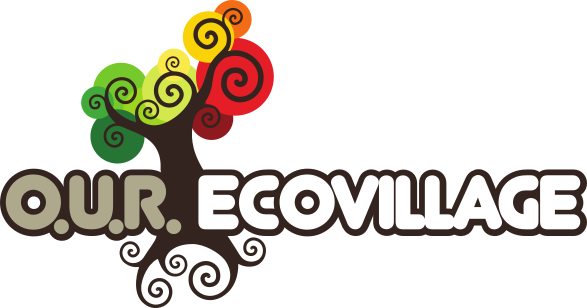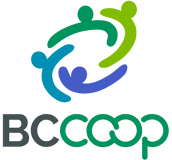
Here at OUR ECOVILLAGE we practice a no waste ethic, even though sometimes we seem to find ourselves with too much of a good thing. We had some potatoes that we couldn’t cook, so instead of tossing them in the compost bucket, we saved them so you can plant your very own potato plant!
This technique is a lot of fun. As it grows, you will have to ‘heel’ it by putting a handful of soil at its base every week or so, burying little potatoes along the way so it ends up growing into a tall plant. When you’re ready to harvest it after 90-100 days, all you have to do is remove the ‘bottomless pot’ and watch the potatoes spill out!
Warning: Never eat green potatoes. They could make you sick!
Plant your very own potato!
Materials:
- One greenish, wrinkly potato with shoots coming out.
- Potting soil
- Water
- Some sort of bottomless pot, 12-24 inches in diameter, which could be:
- A 3-gallon plastic bucket that you cut the bottom out of (as pictured)
- Chicken wire wrapped into a tube and fastened into place,
- or Some other clever way to wrap your potato plant
Steps:
Choose a place to grow your potato. They love lots of sun! They will need a site with good water drainage, too. Set your bottomless pot there.
Add a couple inches of potting soil into the pot, burying ⅔ of the potato and leaving its top exposed.
Say a little prayer for your new spud bud. With luck and a little tender care, you’ll be making french fries this autumn!

Make Potato-Leek Soup
In addition to the wrinkly, wizened potato that came in this week’s box, you are getting some beautiful potatoes from a friendly, local farm. Together with the leeks we grew, you can create a perfect soup for this weird February-in-June weather we’ve been getting lately.
Kitchen craft is one of the most hands-on, useful, and memorable ways to learn while at home. Here, we can use a Potato-Leek Soup as a learning experience for kids at any age, based on this recipe from SimplyRecipes.com.
GRADE CURRICULUM – AIM
Kindergarten – Grade 2 – Food consciousness & establishing healthy habits
A young child can help out in the kitchen at the early stage of meal preparation. You can teach your child the six steps to wash their hands (important!) and then give your child fresh produce to wash. This is a great opportunity to lay those early foundations of mindfulness about food. They’ll learn what a potato looks and feels like before it becomes a soft, delicious mash. They’ll smell the delicate aroma of the leek before it gets cooked into their soup. With a leek, watch the video linked above for a demonstration, do the cutting, and allow your child to dig in and use their (tiny!) fingers to clean out any dirt. At the end of the meal, if you can wrangle your kiddo to do at least one of their dishes, you are well on your way to adding one more foodie to this world!
Grades 3-5 – Peeling, measuring ingredients, & palate development
Though it may be too early to entrust your child with a knife, certain kinds of potato peelers are safe enough to use by kids at the lower primary level. Set up their peeling station, including a compost bucket and clean bowl, for them to whittle away at the spuds. If the peeler has an eye remover, demonstrate it slowly, several times, to reduce the risk of getting cut and be sure they are peeling away from their body. It’s more important that they have fun with the task!
Kids in the upper-primary range are learning how to follow multi-step processes. You can support this learning by having measuring spoons and cups appropriate to this recipe. When measuring chopped potatoes, reassure the learner that it’s okay to estimate. Allow your child to put the ingredients into the soup pot, but be sure you are managing the heat yourself. As you season, taste the soup using clean spoons and co-create the final taste—too much of this, too little of that, saltiness, spiciness. This can empower your little chef to experiment with taste!
Grades 5-8 – Working with recipes & ratios
At this level, children can imagine a process more easily, and their reading ability should be enough to read an entire recipe from start to finish. You can support their learning by explaining any substitutions you might make for items that are either not available or restricted by a particular diet—for instance, vegans can substitute oil for butter, because the important thing is to get the leeks to absorb the oil. By this age your child might be tall enough to reach all the cupboards in your kitchen where the pots, pans, ladles, and spoons they’ll need are located, and can gather all tools and ingredients needed in advance. This practice is called mise en place, and it saves time and effort in the kitchen.
The recipe serves 4-6 people. So what if you are serving a different number of diners? This is the perfect time to practice multiplication and division! Copy the ingredients list onto a piece of paper, multiply each quantity to suit your family’s needs, and support learning about conversions between tablespoons and cups (e.g., if you are doubling the 2 Tbsp of butter, it can be expressed as ¼ cup). Extra credit for your keen Canadian kiddos who simply use the metric system!
Grades 9-10 – Meal Planning
A knowledge of how your body digests food can inform meal planning. Simple carbohydrates, complex carbohydrates such as fiber, fats, proteins, and vitamins show up in the body in their own ways, and an educated cook can get more out of each ingredient. Yet understanding food at a molecular level is only half the process; a culture of mindful eating, in which you sit together with people you love, focusing on the meal, and listening to how they feel during and after a meal, is the truest educational experience.
Potato-leek soup is a hearty, warm dish that hits the spot on a cool evening. Hot soup is always a great way to warm your belly and stimulate your digestive juices at the beginning of a meal. Also, since it has so much liquid, soup is quite filling. A small bowl of hearty soup, followed by a pause before the second course, will go a long way to tide over your hungry pre-teen. Plan to have a protein-rich dish to balance out the high carbohydrate level of the potatoes. Steam or sauté the greens from this week’s box to prevent the glucose spike from the meal.
Here at OUR ECOVILLAGE, we take responsibility for our own dishes and share cooking and cleaning duties. Teaching your teen to clean up after themselves and sometimes others, will be a service to whomever they become roommates with in the future.
Grades 11-12 – Becoming independent & exploring values
As your teen prepares for the next stage of their life, they will have to gain different literacies surrounding food: pricing, seasonality, and responsible sourcing. At OUR ECOVILLAGE we work to give you the highest-quality food that is possible. It might not come out cheaper than Walmart, but as a CSA member, you have decided to join us in creating regenerative culture by building relationships with local farmers.
Your child might find that they share your values; if not, they will have to learn them in their own way. A ‘Big Idea’ from the BC Curriculum for Culinary Arts 12 is that “Service and creativity inform the culinary arts.” The great First Nations author Thomas King writes, “The truth about stories is, that’s all we are.” Tell stories of your successes and failures in your kitchen explorations. Recipes offer just one of infinite possibilities.
What makes a meal great? After you’ve tried the Potato-Leek recipe here, plan to give it another try next week to perfect it. Share it with us at #OUREcovillage #EducationalCSA. Before long, you’ll make it your own and can share it with the world.







